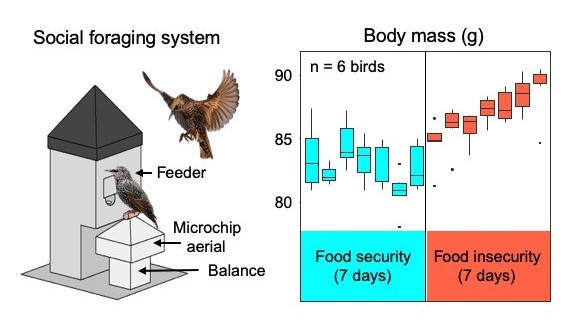Case Studies
Current Case Studies will be displayed here.
Understanding food insecurity through animal behaviour
Synopsis
The ‘food insecurity-obesity paradox’ refers to the correlation observed in high-income countries between food insecurity, defined as limited or unpredictable access to nutritionally adequate food, and obesity. It is widely assumed that food insecurity-induced weight gain is caused by increased food consumption, but the evidence supporting this is weak. We have been using the European starling as an animal model in which to study the psychological and biological impacts of food insecurity in the laboratory. Small birds increase fat stores rapidly in response to environmental changes and are ideal species in which to study body mass regulation. We have developed a novel technology for automatically manipulating food access and measuring foraging, food intake and body mass in small groups of captive starlings, allowing us to experimentally study the effects of food insecurity in a semi-naturalistic setting. We have demonstrated that birds respond to a period of limited and unpredictable food by rapidly increasing their body mass, but contrary to expectations they achieved this despite consuming less food in total. We have evidence that the birds increased their energetic efficiency via a combination of mechanisms including increasing the amount of energy assimilated from food and reducing physical activity.
- Understanding these behaviours in starlings will lead to improvements in our understanding of the drivers of human behaviour, in turn improving how we develop innovative approaches to manage obesity

Contact email:
Melissa.Bateson@newcastle.ac.uk
Further project info:
Main COMSTAR project website: https://www.danielnettle.org.uk/comstar/
.jpg)